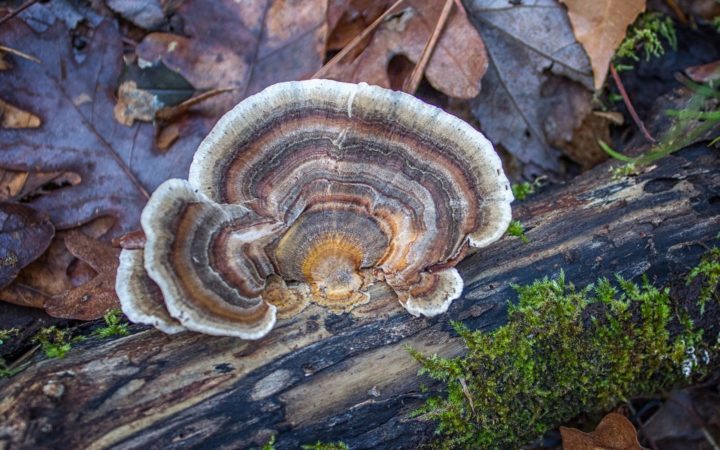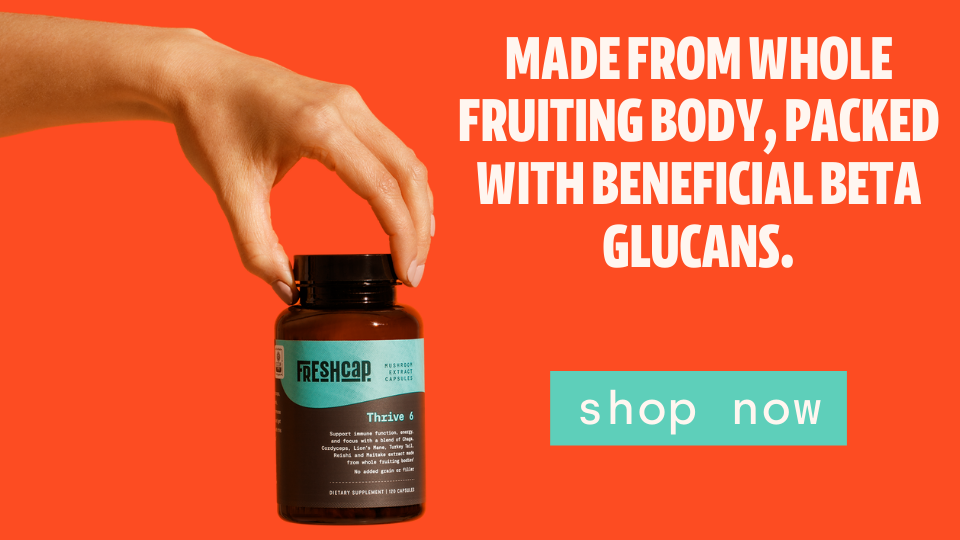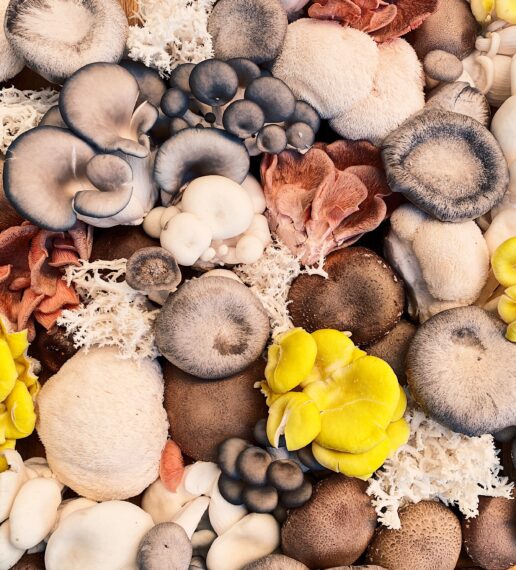How Mushrooms Support Immunity (Top 8 Types)
When you feel like you’re getting sick, chicken soup and a hot cup of tea might sound like just what the doctor ordered. But did you know mushrooms may be one of the best supplements for immune support?
Not just any mushrooms, of course. Only a few out of the thousands of known species are recognized as medicinal mushrooms for immunity*.
Special properties in these mushrooms work with your immune system to improve the way your body responds to infections—which could mean fewer days stuck in bed, cradling a box of tissues while marathoning whatever’s trending on Netflix*.
Curious about how these fungal superheroes work? Let’s take a look at why mushrooms are so magical for immunity and which ones can give you the greatest benefits.
Beta-Glucans: The Mushroom Immune Support Secret
The mystery behind mushrooms’ magic is hidden in their cell walls, which are made up of long chains of connected carbohydrate molecules called polysaccharides—literally “many sugars.”
These polysaccharides can be quite complex, and there are a lot of different ways the parts of the chain can be connected together.
One way these polysaccharides can be classified is by having either alpha linkages or beta linkages. “Alpha” and “beta” simply describe where the bond between carbohydrate molecules in a polysaccharide is located. This simple difference creates two distinct types of molecules:
- Alpha-linkages are found in the starches your body can easily break down, like those in potatoes and rice
- Beta-linkages are the main types of links in mushroom polysaccharides and can’t be broken down during digestion
But just because you can’t digest these polysaccharides doesn’t mean they’re useless. In fact, they include one of the most powerful compounds in medicinal mushrooms: beta-glucans.
Medicinal mushrooms contain many different active compounds, but beta-glucans, in particular, appear to have significant immune-boosting effects*.
Studies show the beta-glucans in mushroom cell walls may protect against bacteria, viruses and pathogenic microbes*.
Medicinal Mushrooms and Immunomodulation
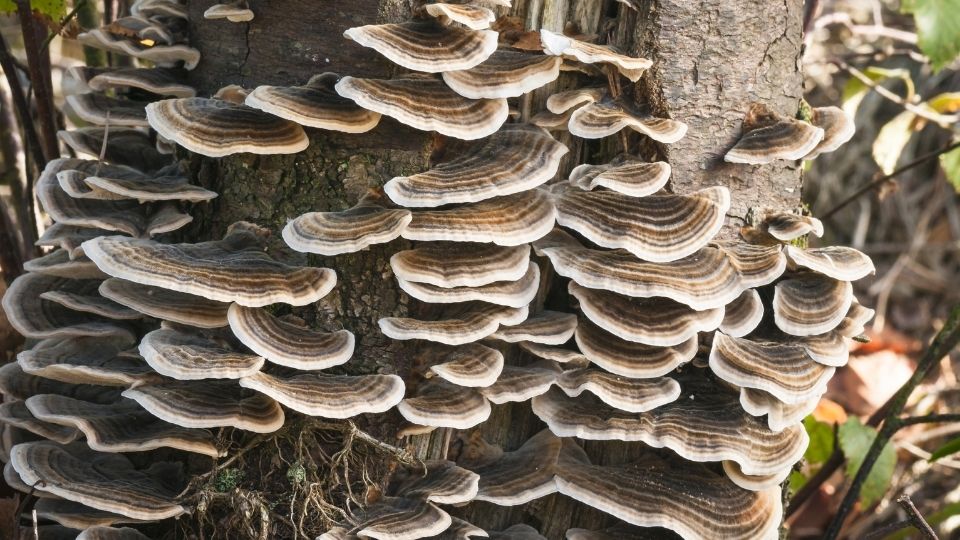
How does it all work? Mushroom polysaccharides initiate a widespread activation of the immune system, which is why beta-glucans are known as immunomodulators or biological response modifiers—they literally modify the way your immune system works.
Rather than doing the work of fighting off infections and zapping suspicious cells themselves, beta-glucans appear to prompt the immune system to step up its own defense mechanisms*.
Specific immune cells and compounds—such as macrophages, dendritic cells, B-cells, T-cells and natural killer cells—are activated or enhanced when beta-glucans interact with receptors on cell surfaces*.[2]
Maintaining a healthy balance of these cells is your secret weapon for building a balanced immune response.
Mushrooms aid in maintaining balance by suppressing excessive activity and boosting low activity*. Known as homeostasis, this balance is key in staying healthy.
Powerful Antioxidant Support
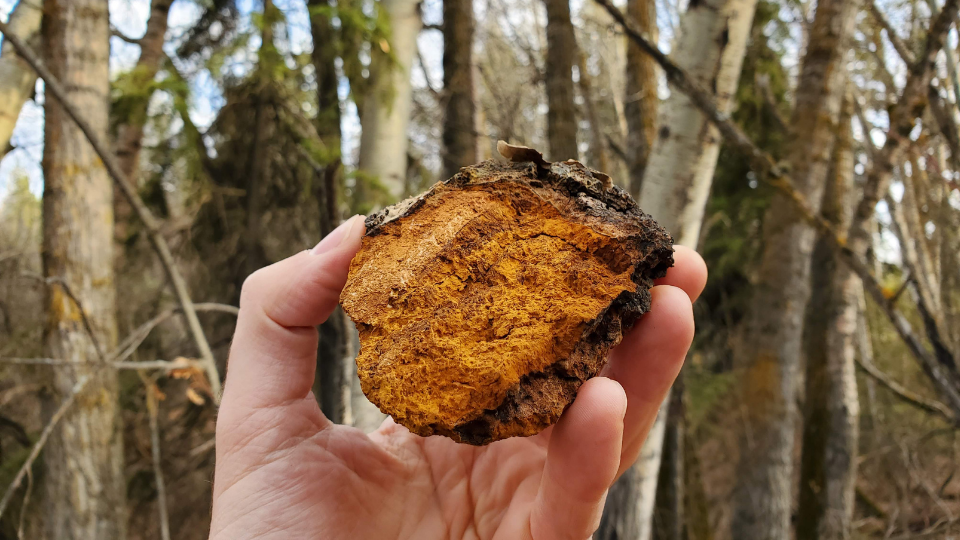
Beta-glucans have a sidekick in this quest: antioxidants.
Medicinal mushrooms known for their immune-boosting properties also contain a lot of antioxidant compounds, which reduce free radical molecules in the body*. Too many free radicals can lead to cell damage, and damage signals the immune system to kick into gear and launch an inflammatory response*.
This response is a normal part of healing from injury but can actually cause more damage if it goes on for too long. Certain species of mushrooms—like Chaga—contain the highest antioxidant levels of any food*.
Others support your body’s own antioxidant production*.
Having enough antioxidants to keep free radicals in check ensures that pro-inflammatory compounds are cleared on a regular basis to keep your body healthy and balanced on a cellular level*.
The 8 Best Mushrooms for Immunity
Which mushrooms have the most immunomodulating and free-radical-busting power? These seven are some of the most powerful players in the medicinal mushroom world.
Reishi: The Mushroom of Immortality
When looking at immune-boosting mushrooms, you can’t ignore reishi*! Known in Eastern cultures as the “mushroom of immortality,” this fan-shaped fungi is recognized for its powerful health effects, which include:
Taking reishi may also help you sleep better, which is another important factor in keeping your immune system strong*.
Turkey Tail: Smart Immune Regulation
Turkey tail mushroom goes by many names, including “cloud mushroom,” as well as its scientific names: Trametes versicolor or Coriolis versicolor.
In the search for mushrooms for immunity, it’s hard to find anything as powerful as turkey tail*.
A protein-bound polysaccharide in this mushroom, known as a polysaccharide peptide (PSP), teams up with another compound called krestin, or PSK. Together, they stimulate and repress different immune responses in unique ways*.[5]
The tiered, shell-like structure of turkey tail is also home to a significant concentration of beta-glucans. This dynamic combination of immunity-boosting compounds makes turkey tail an excellent choice for regulating the immune system and reducing inflammation.*
Maitake: Adaptogenic Power
Maitake mushroom is also called “hen of the woods” because of its feathery appearance. It’s considered a gourmet mushroom and is often used as a succulent meat replacement in global cuisine.
Maitake’s claim to immune fame is its adaptogenic properties. Adaptogens are specific types of plants (or fungi!) that improve the body’s response to stress, support the immune system and defend against disease*. Maitake also provides an excellent source of beta glucans for boosting the immune system*.
Extracts from maitake mushrooms have been shown to stimulate both general and specific immune responses when defending against infection*.[6] The mushrooms also appear to aid in immune balance by helping the body produce simulating and suppressive immune compounds as needed*.[7]
Further studies suggest maitake may be effective for fighting against cancer cells, as well*.[8]
Chaga: The King of Mushrooms for Immunity
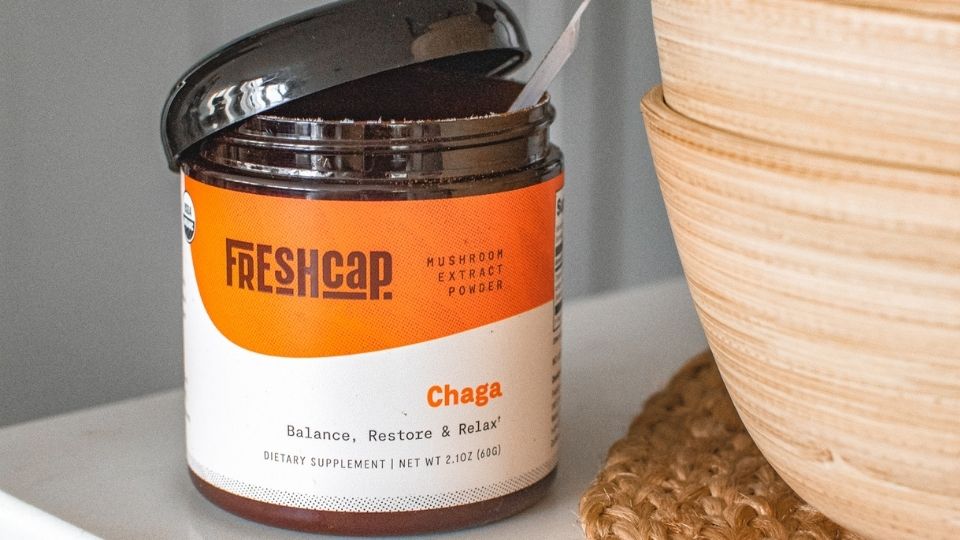
Chaga mushrooms contain a trio of amazing immune boosters:
- Polysaccharides
- Betulinic acid
- High antioxidant levels
In a balancing act that could rival the best acrobats, these compounds boost the production of immune cells and proteins, including pro- and anti-inflammatory compounds, to promote appropriate responses to infections and damaged cells*.
Chaga also has the potential to protect against cancer*. All its active compounds contribute to this effect by disrupting malignant cell division and preventing tumors from creating blood supplies, which could shrink tumors or prevent them from growing in the first place*.[9]
Lion’s Mane: Beta-Glucans Everywhere
High beta-glucan levels make lion’s mane a mushroom supplement powerhouse. This shaggy ‘shroom may also:[10]
- Support the body’s natural anti-inflammatory response*
- Boost the immune cells that destroy invading pathogens*
- Protect against bacterial infections*
Lion’s mane has another trick that could improve immune activity: better gut health*. Some research suggests the way this mushroom interacts with the microbes in your gut may help “train” the immune system to recognize and destroy invaders while leaving your own cells alone*.[11]
Cordyceps: Regulation and Energy
Cordyceps is mainly known for its energizing effects, but its historical use as a treatment for respiratory infections suggests it may also have benefits for the immune system*.
In scientific studies, cordyceps shows promise for:
- Helping the immune system clear out and destroy pathogens*
- Boosting production and release of immune compounds*
- Reducing allergic symptoms and reactions*[12]
And, of course, if you also get more energy from taking this mushroom, you’re more likely to do things that are good for your immune system—like exercise and cook healthy food!
Shiitake: Tasty and Gut Friendly
Speaking of food, shiitake mushrooms are a delicious way to give your immune system some extra support.
Simply eating **this mushroom may be able to improve gut-based immunity, increase beneficial immune compounds and balance inflammatory responses*.[13] This could be a result of the way shiitake affects how specific genes are expressed in the gut*.[14]
Shiitake may also boost white blood cell production to strengthen your body’s “front line” defenses against infection*.[15]
These mushrooms make a delicious and tasty addition to stir fries, soups and noodle dishes. They’re easy to find at most well-stocked grocery stores and Asian markets, so why not give them a try?
Tremella: Not Just for Skin
Tremella is an interesting mushroom that looks more like a deep sea creature than a superhero for immunity. But don’t let its pale, icy appearance fool you—this is one functional fungus!
Typically known as the “beauty mushroom” due to its benefits for skin health, tremella also appears to have positive effects on the immune system*. In China, they actually use tremella polysaccharide capsules to bring up white blood cell counts in cancer patients after treatment*![16]
Why does this work? The polysaccharides seem to have several effects that act together to boost the immune system, including:
- Increasing levels of immune compounds in the blood, liver, spleen*[17]
- Lowering a growth factor that can become a cancer promoter in malignant cells*
- Preventing cancer cells from surviving*[18]
Tremella is also a source of antioxidants, which support polysaccharides to give pathogens a one-two punch*.
How to Use Mushrooms for Immune Support
Mushroom capsules, powders and tinctures are all good options for getting the immune benefits of beta-glucans and antioxidants. A typical dose is usually one gram of powder or one to two pills per day. Tincture doses vary depending on how the tincture was prepared.
Follow the dosing instructions on the bottle or package for best results. If you’ve never taken medicinal mushrooms before, start with the lowest dose to see how your body responds and only increase if necessary.
Looking for a tastier way to boost immunity? Try out a few of these medicinal mushroom recipes:
- Immune Supporting Turkey Tail Granola Mix
- Turkey Tail Turmeric Lemonade
- Stayin’ Home Chagaccino
- Detoxifying Green Dream Shake
- Spicy Coconut Lentil Soup
What’s the Best Mushroom Supplement for Immunity?
You’ll get the biggest beta-glucan bang for your buck if you look for dual-extracted mushroom supplements made from fruiting bodies. Some products use mycelium grown on grain, and although mycelium has some amazing properties of its own, the grain gets mixed into the supplement during production and dilutes its potency.
The key is to read labels to always know what you’re taking!
